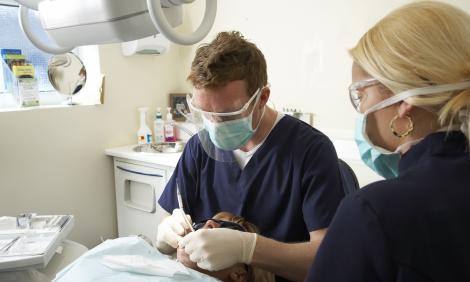Dental support worker
Dental support workers are part of the dental health team. See how they help to treat patients and give advice on looking after teeth. Find out how you could become a dental support worker.
This page has information on the role of dental support workers, including entry requirements and skills needed.
Working life
Dental support workers are clinical support workers who work as part of the dental team. In this role, you'll work under the supervision of a dentist or a dental nurse to treat patients and give advice.
Working as a dental support worker, you'll:
- greet patients and reassures people who are nervous make appointments
- give basic advice about dental care
- keep records
- mix the materials for filling teeth
- help with x-rays
- sterilise instruments and equipment
- pass instruments to the dentist
- help patients with mouth rinsing
Where will I work?
You'll work in clinics which could be based in the community or in a hospital. You may also visit patients in their homes or in residential or care homes if patients cannot travel.
Some dental support workers may also be known as dental health support workers. They give advice on looking after teeth including
- preventing tooth decay
- showing adults and children how to brush teeth effectively
- flouride treatment
You may visit schools, nurseries and other community settings to show people how to look after their teeth. You may also visit families at home.
Who will I work with?
As well as working with dentists and dental nurses, you may also work with dental hygienists and dental therapists. You will have a lot of contact with patients.
Entry requirements
There are no set entry requirements for dental support workers. Employers usually expect good literacy, numeracy and IT skills. They may ask for GCSEs or equivalent qualifications.
Employers often ask for relevant work experience. Even where this is not specified, it would be an advantage if you have worked in health or social care, either in paid employment or voluntary work. There are sometimes apprenticeships in dental support roles.
Find out more about apprenticeships
Personal characteristics and skills needed
Dental support workers need to:
- reassure patients
- be careful and methodical
- follow instructions carefully
- record data accurately
- pay attention to detail
- explain clearly to patients
- work with all types of people
You'll also need
- good communication skills
- skills in training and speaking to groups
Training and development
You will receive the training you need to work as a dental support worker. This includes:
- an introduction to the department and its systems and procedures
- information about dentistry and oral hygiene
- using the equipment
-
Dental support staff working in the NHS are paid on the Agenda for Change (AfC) pay system. You would typically start on AfC band 2. With further training, experience and provided you had the appropriate qualifications necessary, you could apply for training in the other dental care professionals roles such as dental nurse, dental hygienist or dental therapist.
Most dental support workers in the NHS work standard hours, which are likely to be around 37.5 a week. They may work some evenings or weekends.
Terms and conditions will usually be different for dental support staff working outside of the NHS.
-
You may be able to apply to train for other roles in the dental health team, such as a dental hygienist, dental therapist or dental nurse.
-
Most NHS trusts advertise their vacancies on NHS Jobs. Some advertise on their own websites. You can find a list of NHS organisations on NHS Choices.
If you're applying for a role either directly in the NHS or in an organisation that provides NHS services, you'll be asked to show how you think the NHS values apply in your everyday work.





